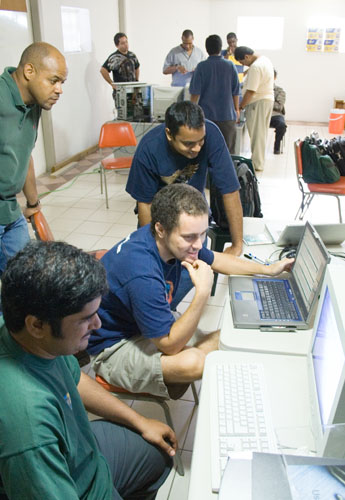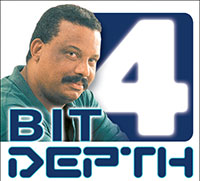BitDepth 491 - September 20
11/01/09 17:43 Filed in: BitDepth - September 2005
FLOS was the centrepiece of Software Freedom Day.
Software that’s built to be free

Participants at the FLOS “installfest” puzzle over a tricky Linux installation. Photograph by Mark Lyndersay.
If I told you that a group of geeks sitting at their computers all over the world brought IBM to its knees, you’d probably be inclined to laugh at me. But that’s exactly what happened when big blue went up against the Open Source Apache web server with their own packaged commercial offering.
After fighting for marketshare against the dominant (and free) web server package, IBM eventually ran up the white flag and joined the Open Source group that worked on Apache.
The Apache’s group’s terms were simple. Yes, you can use Apache as the backbone for your new Websphere web server package. No, you won’t get away by just paying lip service to contributing, only your best programmers will be good enough for the project.
I sat in on a geek meet last weekend listening to the leadership of the Free, Open, Libré Software (FLOS) group talk about their approaches to Open Source and free programming and the results they have had. These weren’t sessions for the faint of heart. Strewn around on tables were books on Knoppix, CDs with odd Linux installs and computers in various stages of disassembly. If you were afraid to look at streaming code and raw silicon, this was a very bad place to be.
The occasion was Free Software Day, a celebration of Open Source and free software solutions celebrated worldwide. Free software is code that anyone can work on, but the results must also be distributed without cost. Open Source products can be licensed as the backbone of commercial software, which is what IBM did with Websphere.
In Trinidad, Free Software Day was spread over two afternoons under the fluorescent glow of lights in the basement of an engineering firm. That’s where local programmers and FLOS representatives Anil Ramnaran, Richard Jobity and Allan Samaroo shared their perspectives on the movement and how they take part in it and then on the second day, helped users install rare and curious forms of Unix and Linux like Ubuntu on their computers.
Anil Ramnaran spoke compellingly about Burrokeet, the learning content management softwar that he works on, a web-based framework for gathering teaching materials in an accessible format that’s based on Apache’s Forrest project.
“My involvement with developing Burrokeet and later working on Apache Forrest exposed me to a new way of developing software where there was more community involvement in its direction and structure,” said Ramnaran. “The experience with Apache Forrest shows me how a new developer becomes part of a larger established open source community while Burrokeet gives me the opportunity to see how a new Open Source project goes about building its base of developers and users.”
Richard Jobity, an economist by profession, sees Open Source with the eyes of an inveterate tinkerer with a world view that envisions software independence.
“There are a lot of bright people in the Caribbean that can use FLOS software (creating indigenous companies and services) and open source techniques (including transparency and open processes) improve the general quality of life,” says Jobity.
“For small island states facing the end of bananas and sugar, and unable to pay (for a) metropolitan license, FLOS may literally be the last, best option. It's not only about software, but can extend to a different and maybe better way of doing things. Not having options is generally not a good thing. Plus, FLOS is the easiest (and cheapest, by the way) way of getting the skills needed to empower ourselves. We can become creators of our own software, rather than consumers of mysterious locked bits of code.”
Both Open Source and free software leverage what author James Surowiecki describes as the wisdom of crowds. In his book by that name, he offers many instances in which large groups of people prove smarter than smaller gatherings of experts.
Software companies point to the lack of a centralised service model in free and open source software products but the champions of the distributed development model point to the radical pace of improvement in popular products like the web browser Firefox and the Microsoft Office alternative Open Office.
Nothing about FLOS’ efforts might be described as user-friendly, but for advanced users who aren’t afraid of command-line prompts, the movement offers intriguing alternatives to products once considered unassailable in the market.

Participants at the FLOS “installfest” puzzle over a tricky Linux installation. Photograph by Mark Lyndersay.
If I told you that a group of geeks sitting at their computers all over the world brought IBM to its knees, you’d probably be inclined to laugh at me. But that’s exactly what happened when big blue went up against the Open Source Apache web server with their own packaged commercial offering.
After fighting for marketshare against the dominant (and free) web server package, IBM eventually ran up the white flag and joined the Open Source group that worked on Apache.
The Apache’s group’s terms were simple. Yes, you can use Apache as the backbone for your new Websphere web server package. No, you won’t get away by just paying lip service to contributing, only your best programmers will be good enough for the project.
I sat in on a geek meet last weekend listening to the leadership of the Free, Open, Libré Software (FLOS) group talk about their approaches to Open Source and free programming and the results they have had. These weren’t sessions for the faint of heart. Strewn around on tables were books on Knoppix, CDs with odd Linux installs and computers in various stages of disassembly. If you were afraid to look at streaming code and raw silicon, this was a very bad place to be.
The occasion was Free Software Day, a celebration of Open Source and free software solutions celebrated worldwide. Free software is code that anyone can work on, but the results must also be distributed without cost. Open Source products can be licensed as the backbone of commercial software, which is what IBM did with Websphere.
In Trinidad, Free Software Day was spread over two afternoons under the fluorescent glow of lights in the basement of an engineering firm. That’s where local programmers and FLOS representatives Anil Ramnaran, Richard Jobity and Allan Samaroo shared their perspectives on the movement and how they take part in it and then on the second day, helped users install rare and curious forms of Unix and Linux like Ubuntu on their computers.
Anil Ramnaran spoke compellingly about Burrokeet, the learning content management softwar that he works on, a web-based framework for gathering teaching materials in an accessible format that’s based on Apache’s Forrest project.
“My involvement with developing Burrokeet and later working on Apache Forrest exposed me to a new way of developing software where there was more community involvement in its direction and structure,” said Ramnaran. “The experience with Apache Forrest shows me how a new developer becomes part of a larger established open source community while Burrokeet gives me the opportunity to see how a new Open Source project goes about building its base of developers and users.”
Richard Jobity, an economist by profession, sees Open Source with the eyes of an inveterate tinkerer with a world view that envisions software independence.
“There are a lot of bright people in the Caribbean that can use FLOS software (creating indigenous companies and services) and open source techniques (including transparency and open processes) improve the general quality of life,” says Jobity.
“For small island states facing the end of bananas and sugar, and unable to pay (for a) metropolitan license, FLOS may literally be the last, best option. It's not only about software, but can extend to a different and maybe better way of doing things. Not having options is generally not a good thing. Plus, FLOS is the easiest (and cheapest, by the way) way of getting the skills needed to empower ourselves. We can become creators of our own software, rather than consumers of mysterious locked bits of code.”
Both Open Source and free software leverage what author James Surowiecki describes as the wisdom of crowds. In his book by that name, he offers many instances in which large groups of people prove smarter than smaller gatherings of experts.
Software companies point to the lack of a centralised service model in free and open source software products but the champions of the distributed development model point to the radical pace of improvement in popular products like the web browser Firefox and the Microsoft Office alternative Open Office.
Nothing about FLOS’ efforts might be described as user-friendly, but for advanced users who aren’t afraid of command-line prompts, the movement offers intriguing alternatives to products once considered unassailable in the market.
blog comments powered by Disqus

